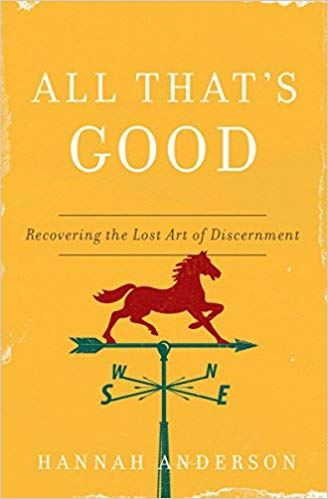10 Habits of Discerning People

(and How Discernment Equips Them to Navigate a Broken, Complicated World)
One glance at the headlines will tell you that the world is a dangerous, confusing place. From natural disasters to church scandals to heartbreak closer to home, it can feel like nowhere is safe. Maybe the best thing you can do is just hunker down and try to survive. But what if God wants more for you than to just survive? What if God wants you to thrive and enjoy His goodness despite the brokenness around you?
In John 17, Jesus prays for His followers—people like you and me—who find themselves overwhelmed by the world around them. He said, “I am not praying that you take them out of the world but that you protect them… sanctify them by the truth; your word is truth.” Instead of retreating from the world, God intends to equip us to meet its challenges with confidence and joy. Instead of changing our circumstances, He intends to change us by making us people who can discern the difference between what is good and what isn’t. Or as Paul puts it in Romans 12, he intends to transform us by renewing our minds so we’ll know what is good, perfect, and acceptable.
So what do discerning people know that the rest of us don’t? What do discerning people do that makes them uniquely capable of navigating a broken, complicated world?
Here are 10 habits of discerning people:
1. Discerning people live in right relationship to God.
The first thing that sets discerning people apart is that they are humble. They know how much they don’t know. It’s tempting to rush into situations or decisions confident that we already know the answer to them. Maybe we think we’ve already learned the “right” answer. Or maybe we rely on our gut instinct. Either way, we don’t pause long enough to remember that our minds are limited and our hearts are easily led astray. Proverbs 1:7 says that “the fear of the LORD is the beginning of wisdom.” In other words, discerning people know that God—not their own mind's experience or instinct—is the source of wisdom and ultimately the source of safety. From this place of humility, discerning people are able to ask for help from the One who gives it freely and abundantly.
2. Discerning people focus on finding goodness in the brokenness
In a world cursed by sin, we can quickly become distracted by the brokenness and begin to believe that it is more powerful than God’s goodness. But when this happens, we also begin to make decisions from a mindset of fear and self-protection. Trapped by negativity, we’ll only have eyes for what’s wrong. We’ll shrink back from any kind of risk and hunker down into our safe places, seeing anyone who is different from us as a threat. Isolated and alone, we’re unable to enjoy what goodness the world does have to offer. Discerning people know that God made the world good and that He sustains it in goodness. Yes, the world is cursed by sin but through Christ, God is redeeming it and us. “I would have despaired,” David writes in Psalm 27:13, “unless I had believed I would see the goodness of God in the land of the living” (NASB). Discerning people have confidence in God’s goodness.
3. Discerning people know the difference between the way things are and the way things should be.
As much as discerning people look for goodness in the brokenness, they do not deny the brokenness or pretend that it doesn’t exist. They are not idealists. They know that that the “way the world works” is not always the way God intended it to work. So they evaluate everything by the authority of the Scripture and the person of Jesus Christ, testing it to see whether it meets God’s standard of goodness. Sometimes this means rejecting the status quo or questioning their own long-held beliefs. But through it all, they know that God is the ultimate standard of what is right and they must submit all things—even their most deeply held customs and practices—to him.
4. Discerning people invest in things and relationships that will last.
Because the world is not yet what it should be, we all experience trouble and difficulty in this life. When we do, we can be tempted to comfort ourselves with fleeting pleasure: expensive gadgets, addictive substances, unhealthy relationships, and mindless entertainment. At first, these things may bring us a kind of relief. The new car or that third glass of wine will make you happy, at least temporarily; but like an addict, you’ll quickly need another hit when the initial pleasure wears off. And you’ll find yourself running in circles trying to find it. Discerning people know that lasting happiness comes from things that are eternal. They are not immune to suffering in this life, but they invest in relationships and things that bring long-term stability instead of short-term relief.
5. Discerning people know the importance of truth.
In a world of #fakenews and #alternativefacts, it can seem like we live in competing realities. “Your truth” is not “my truth” and whatever we personally want to believe becomes truth for us. This makes for a very fractured world where we are isolated from even our friends and neighbors. Discerning people know that truth is not a private matter and that we must have shared truth to flourish. They are willing to submit themselves and their ideas to scrutiny, knowing that opinions and commentary are no replacement for facts. And when they encounter information they’ve never heard before, they test it—not by their own opinions or emotions—but by the larger body of shared truth. And ultimately they know that we all must submit to the One who “the Way, the Truth, and the Life.” In this sense, discerning people are honest people. Honest with themselves; honest with the facts; and honest with others.
6. Discerning people listen to experts.
Not only do discerning people walk humbly before God, but they also walk humbly before their fellow man deferring to those who have more experience and knowledge than they do. In a world of search engines and social media, it can be tempting to believe that everyone’s opinion on any given subject is equally valid. But access to information is not knowledge, and tips and trick are not skill and expertise. Discerning people know that it takes years of study and life experience to become an expert and they honor that. They also know the difference between an expert and an elitist. An expert is a person who has expertise in a particular field of knowledge while an elitist is a person who thinks that they have expertise in every field of knowledge. In Romans 13, Paul tells us to give honor to those who deserve honor. Discerning people know to honor those whose life experience or education give them particular insight—whether it’s a mother who knows her child better than anyone else or a doctor who knows her field. In both cases, a discerning person will honor the specific expertise of each.
7. Discerning people pay attention to words and actions.
One thing that makes the world so confusing is that people behave inconsistently. Politicians promise one thing but do another. Husbands and wives vow faithfulness only to cheat a few months or years down the road. It’s hard to know who you can trust. At its root, this disconnect between our words and actions reveals a deeper disconnect in our hearts. The book of James describes this as being “double-minded” and says that double-minded people are unstable in all their ways. Discerning people know that people with mixed-motives will be unstable and so they don’t trust them. They pay attention to the difference between a person’s words and actions and are not easily swayed by lip service.
8. Discerning people embrace goodness wherever they find it.
In the chaos of the world, we tend to cluster in like-minded groups, believing that our tribe will give us a sense of safety and security. Unfortunately, this “us vs. them” approach can blind us to the weakness within our group. It can also make us miss the good things that happen outside it. Discerning people know that both good and bad exist in every space. That’s why Paul tells us in Philippians 4:8 to think on“whatever is true, honorable, just, pure, lovely, and of good report." Rather than toeing the party line, discerning people are committed to finding goodness wherever it may exist. “If there be any moral excellence,” the Scripture continues, “and if there is be anything praiseworthy—dwell on these things.”
9. Discerning people pursue the best possible solution, knowing that no solution is perfect.
Because the world is broken, our decisions will be inadequate in many ways. We simply don’t have the ability or the options to find perfect solutions. But if we wait for the perfect, it’s entirely possible that we’ll miss the good. So discerning people know how to make pragmatic decisions. This doesn’t mean that the ends justify the means or that we can do whatever we what. It means learning the difference between “unprincipled pragmatism” and “principled pragmatism.” Unprincipled pragmatism takes advantage of the brokenness using and manipulating it for self-serving purposes. Principled pragmatism, on the other hand, accepts the reality of brokenness and tries to make decisions that promote healing and wholeness. All with an eye to the day when God sets all things right again.
10. Discerning people use their wisdom to help others.
Instead of seeing discernment as a source of superiority, discerning people use their insight to serve the people around them. Whether it’s in their church, their family, or their neighborhood, they use knowledge to build up and unify—not tear down or create division. Sometimes this means having the patience to wait while others think through what you already know. Sometimes it means forgoing their preferences for the good of others. Sometimes it might even mean being misunderstood precisely because other people can’t yet see what they do. But because discerning people know the difference between what’s good and what’s not, they also know to evaluate their own actions. They resist the temptation to flaunt knowledge or prove themselves right. At the end of the day, they know that any wisdom they have is given to them for the common good.
God has not left us alone in this world. Through the Holy Spirit and the Scripture, He is renewing our minds so we can discern what His holy and perfect will. But this process requires humility and a willingness to be changed. God isn’t interested in our being right so much as our being made right—right with him and right with each other. As we grow in wisdom and the knowledge of Christ, we’ll find ourselves increasingly able to meet the challenges of a broken world. And little by little, we’ll find ourselves experiencing all that He has planned for us. Little by little, we’ll find ourselves being made good and discovering all that’s good in the world around us.

Photo credit: ©Thinkstock/SIphotography
Originally published November 12, 2018.







